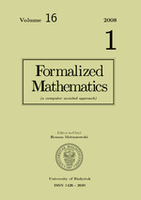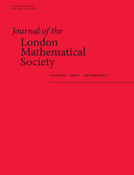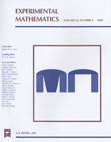
Formalized Mathematics
Scope & Guideline
Exploring the Intersection of Logic and Mathematics
Introduction
Aims and Scopes
- Formalization of Mathematical Concepts:
The journal emphasizes the formalization of various mathematical concepts across different branches, ensuring that definitions, theorems, and proofs are expressed in a precise and verifiable manner. - Integration of Various Mathematical Fields:
There is a strong focus on integrating concepts from diverse areas of mathematics, such as algebra, geometry, number theory, and analysis, demonstrating the interconnectedness of these fields. - Application of Formal Methods:
The journal encourages the application of formal methods, including proof assistants and computational tools, to enhance the rigor and reliability of mathematical discourse. - Exploration of New Mathematical Theories:
'Formalized Mathematics' is a venue for exploring and proposing new theories, models, and frameworks within established mathematical disciplines, contributing to the advancement of mathematical knowledge. - Educational Resources and Expository Works:
The journal also publishes educational articles that aim to elucidate complex mathematical concepts, making them more accessible to students and educators.
Trending and Emerging
- Advanced Formalization Techniques:
There is a significant trend towards the use of advanced formalization techniques, including proof assistants like Mizar, indicating a growing community interested in the application of computational tools to verify mathematical proofs. - Multidimensional Analysis:
Recent publications show an increasing interest in multidimensional analysis and measure theory, reflecting a broader trend in mathematics that seeks to understand complex systems and their properties. - Game Theory and Its Applications:
The incorporation of game-theoretic approaches in mathematical problems suggests a rising trend in exploring strategic interactions and decision-making processes within formalized mathematics. - Graph Theory and Combinatorics:
The growing number of papers related to graph theory and combinatorial mathematics indicates an emerging focus on these areas, likely due to their applications in computer science and network theory. - Formalization of Algebraic Geometry:
The journal is witnessing a rise in publications concerning algebraic geometry, particularly emphasizing formalization, which reflects a broader interest in this complex area of mathematics.
Declining or Waning
- Traditional Calculus:
There appears to be a waning interest in traditional calculus topics, with fewer papers focusing on basic integration and differentiation concepts, as the journal shifts towards more complex and abstract mathematical theories. - Elementary Number Theory:
Although elementary number theory was once a significant area of focus, the increasing complexity of recent publications suggests a shift away from basic problems and toward more advanced topics within the field. - Basic Algebraic Structures:
The exploration of basic algebraic structures, such as simple groups and rings, has decreased, as the journal seems to favor more intricate and novel algebraic theories.
Similar Journals

BULLETIN OF THE AMERICAN MATHEMATICAL SOCIETY
Elevating scholarly communication in mathematics.BULLETIN OF THE AMERICAN MATHEMATICAL SOCIETY is a premier peer-reviewed journal published by the American Mathematical Society, dedicated to advancing the field of mathematics since its inception in 1891. With its rigorous focus on both applied and theoretical mathematics, the journal has achieved a notable Q1 ranking in both Applied Mathematics and Mathematics (miscellaneous) categories for 2023, reinforcing its significance in the academic community. With an ISSN of 0273-0979 and an E-ISSN of 1088-9485, it serves as a vital resource for researchers and practitioners, facilitating dissemination of high-quality mathematical research and insights. Despite not offering Open Access, the journal continues to attract a wide readership, spotlighting important developments and emerging trends in the discipline. Its robust Scopus rankings—placing it in the 82nd percentile for General Mathematics and the 62nd percentile for Applied Mathematics—underscore its role as a critical avenue for scholarly communication and innovation. As the field of mathematics evolves, the BULLETIN OF THE AMERICAN MATHEMATICAL SOCIETY remains committed to fostering dialogue and disseminating significant findings that shape the future of mathematical research.

BOLETIN DE LA SOCIEDAD MATEMATICA MEXICANA
Exploring the Depths of Mathematical KnowledgeBOLETIN DE LA SOCIEDAD MATEMATICA MEXICANA, published by Springer International Publishing AG, is a pivotal journal in the field of mathematics, particularly recognized for its contributions to the miscellaneous mathematics category, holding a commendable Q2 ranking as of 2023. With an ISSN of 1405-213X and an E-ISSN of 2296-4495, the journal serves as a platform for disseminating high-quality research and innovations from both national and international scholars. Operating from Switzerland, the journal encompasses a broad range of topics within mathematics, supporting the development and communication of mathematical knowledge. Although it is not open access, it remains a respected source for researchers, professionals, and students seeking to deepen their understanding of mathematical concepts and applications. Published continuously and rigorously since its converged years, BOLETIN DE LA SOCIEDAD MATEMATICA MEXICANA plays a crucial role in advancing mathematical discourse and collaboration across disciplines.

JOURNAL OF THE LONDON MATHEMATICAL SOCIETY-SECOND SERIES
Exploring Innovative Ideas in General MathematicsJOURNAL OF THE LONDON MATHEMATICAL SOCIETY-SECOND SERIES, published by Wiley, stands as a premier publication in the field of mathematics, particularly recognized for its contributions to general mathematics and its ability to shape contemporary mathematical discourse. With an impact factor that reflects its high citation rate and academic influence, this journal has secured a prestigious Q1 ranking in the Mathematics (miscellaneous) category as of 2023. Encompassing a rich history from its inception in 1926 through various publication phases until 2024, it continues to attract and disseminate innovative research, serving as a vital resource for scholars, practitioners, and students alike. Although it does not currently offer open access options, the journal's commitment to advancing mathematical knowledge makes it an essential source for the latest developments in the discipline. For those engaged in mathematical research, insights from the JOURNAL OF THE LONDON MATHEMATICAL SOCIETY-SECOND SERIES are invaluable in fostering a deeper understanding and sparking new ideas within the mathematical community.

Research in the Mathematical Sciences
Elevating the Standards of Mathematical ScholarshipResearch in the Mathematical Sciences is a prestigious journal published by Springer International Publishing AG, specializing in a diverse range of mathematical disciplines. With an ISSN of 2522-0144 and an E-ISSN of 2197-9847, this journal operates out of Switzerland and has established a reputation for excellence in research dissemination since its inception in 2014. The journal is currently ranked in the highly regarded Q2 quartile for Applied Mathematics, Computational Mathematics, and Mathematics (miscellaneous), along with a Q3 rank in Theoretical Computer Science, reflecting its substantial influence within the academic community. Researchers will find great value in this journal as it features high-quality, peer-reviewed articles that contribute to the advancement of mathematical sciences. The journal promotes open access options, facilitating greater accessibility to innovative research findings. With its comprehensive scope and strong Scopus rankings, Research in the Mathematical Sciences serves as an essential resource for academics, professionals, and students eager to stay at the forefront of mathematical research and its applications.

COLLOQUIUM MATHEMATICUM
Engaging minds with groundbreaking mathematical concepts.COLLOQUIUM MATHEMATICUM, published by ARS POLONA-RUCH, serves as an essential platform for the dissemination of innovative research in the field of mathematics. With an ISSN of 0010-1354 and a dedicated E-ISSN of 1730-6302, this journal plays a crucial role in advancing mathematical knowledge and fostering collaboration within the academic community. Although it is categorized in the Q3 quartile for miscellaneous mathematics, its content consistently attracts a diverse readership, reflecting a wide array of mathematical disciplines. Spanning publication years from 2001 to 2009 and resuming from 2011 to the present, *COLLOQUIUM MATHEMATICUM* offers researchers, professionals, and students the unique opportunity to engage with groundbreaking concepts and methodologies. With its home base in Warsaw, Poland, this journal not only contributes to the regional mathematical landscape but also impacts the broader global community. While currently not adopting an open access model, the journal remains committed to quality research, evidenced by its Scopus ranking within the general mathematics category. Engage with *COLLOQUIUM MATHEMATICUM* to be at the forefront of mathematical exploration.

Vietnam Journal of Mathematics
Unveiling New Horizons in Mathematical InquiryVietnam Journal of Mathematics, published by SPRINGER SINGAPORE PTE LTD, serves as a prominent platform for disseminating high-quality research in the field of mathematics. With an ISSN of 2305-221X and E-ISSN 2305-2228, this esteemed journal has established itself as a noteworthy contributor to the academic landscape since its inception in 2013, continuing its coverage until 2024. Enjoying a Q2 ranking in Mathematics (miscellaneous) for 2023, and holding a commendable Scopus rank of #126 out of 399 in General Mathematics, the journal stands at the intersection of innovation and scholarly excellence. Although still developing its open-access model, it provides a valuable resource for researchers, professionals, and students alike, who are keen to explore the vast universe of mathematical inquiry and application. As the journal progresses, it strives not only to publish original research but also to foster dialogue and collaboration within the global mathematics community.

JOURNAL OF AUTOMATED REASONING
Elevating Knowledge in AI and MathematicsJOURNAL OF AUTOMATED REASONING is a premier academic journal published by SPRINGER, focusing on the dynamic and evolving fields of Artificial Intelligence, Computational Theory and Mathematics, and Software. With an ISSN of 0168-7433 and E-ISSN 1573-0670, this journal ranks impressively in the second quartile (Q2) across multiple categories, reflecting its significant contribution to the advancement of knowledge in automated reasoning methodologies. Since its inception in 1985, it has served as a vital platform for researchers and professionals to share groundbreaking findings and innovative techniques, facilitating the exploration of algorithms, logical frameworks, and reasoning processes that underpin artificial intelligence systems. Although it does not currently offer Open Access options, it remains a highly regarded resource, cited widely in academia, with its impactful publications reflecting deep insights and rigorous scholarly standards. The journal’s esteemed status and its ongoing commitment to fostering a greater understanding of automated reasoning make it an invaluable asset for those dedicated to pushing the boundaries of these interdisciplinary fields.

Research in Mathematics
Fostering groundbreaking discussions in pure and applied mathematics.Research in Mathematics, published by TAYLOR & FRANCIS LTD, is an emerging academic journal dedicated to advancing the field of mathematics through innovative research and scholarship. With an E-ISSN of 2768-4830, this journal aims to foster discussion and dissemination of high-quality mathematical research across a broad spectrum of disciplines, including pure mathematics and applied mathematics. As part of its commitment to accessibility, Research in Mathematics operates on an open-access model, allowing researchers, professionals, and students to engage with groundbreaking studies without barriers. Despite its recent establishment since 2016, and with a current Scopus ranking that positions it in the lower percentile among its peers, the journal offers a platform for new voices in the mathematics community. Its objectives include enhancing visibility for novel mathematical concepts, methodologies, and applications that can significantly impact the academic and professional landscapes. Authors are encouraged to submit original research articles, review papers, and case studies that push the boundaries of mathematical knowledge.

Results in Mathematics
Innovating the Future of Mathematics Through Rigorous Scholarship.Results in Mathematics, published by SPRINGER BASEL AG, is a prestigious academic journal dedicated to advancing the field of mathematics since its inception in 1978. Based in Switzerland, this journal has garnered a significant reputation, holding a Q2 ranking in both Applied Mathematics and miscellaneous Mathematics categories according to the latest 2023 metrics. The journal is a vital resource for researchers, professionals, and students, encouraging open dialogue about emerging mathematical concepts and methodologies. Our editorial objective is to publish high-quality research articles that contribute to theoretical advancements and practical applications in mathematics. Although it does not currently offer open access options, it provides in-depth studies and articles that fortify the knowledge base within the mathematical community. With a commitment to innovation and academic rigor, Results in Mathematics continues to serve as an essential platform for scholarly communication and exploration.

EXPERIMENTAL MATHEMATICS
Transforming Mathematical Concepts into Practical ApplicationsEXPERIMENTAL MATHEMATICS is a distinguished journal published by Taylor & Francis Inc, dedicated to the burgeoning field of mathematics with a special focus on experimental methodologies that illuminate mathematical theories and applications. With an ISSN of 1058-6458 and an E-ISSN of 1944-950X, this journal has been pivotal in advancing research from 1992 to 2024, achieving an impressive Q2 ranking in the Mathematics category for 2023. It serves as a vital platform for researchers and practitioners to share innovative experimental results that contribute to mathematical understanding and training. Although it operates on a subscription basis, the journal is accessible to a broad audience within the mathematical community, boasting a Scopus rank of #153 out of 399 in General Mathematics, placing it in the 61st percentile. Research published in EXPERIMENTAL MATHEMATICS not only enhances academic discourse but also fosters collaboration between theoretical and applied mathematicians, making it an essential resource for students, professionals, and researchers alike.